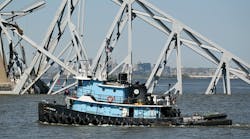A senior EPA official gave a mixed review to the General Accounting Office report on 2007 diesel engine emissions standards during a day-long event examining the issue.
The GAO report was requested by Congress to measure effects of the Oct. 2002 emissions requirements on trucking and evaluate efforts to meet the more stringent '07 levels. It offered two proposals for smoothing the move to the new engine technology needed to meet '07 levels: economic incentives to encourage fleets to buy the cleaner engines quickly; and an independent review panel to monitor progress toward commercial release of '07-level diesels and the fuel needed to run them.
The EPA is “onboard with the concept of economic incentives,” said Jeffrey Holmstead, Assistant Administrator, Office of Air and Radiation, EPA, who addressed fleet executives last month at a diesel emissions summit sponsored by ATA and TMC. But, he said, his agency had “one concern with the GAO report — the independent review panel.” EPA fears that such a panel might delay progress in finalizing development of engines that meet the '07 levels.
John B. Stephenson, co-author of the report and GAO director of environmental issues, said his office stood by the independent panel recommendation as a way to reassure trucking “stakeholders” that reliable engines would be ready by the '07 deadline and that fleets would not have to pre-buy large numbers of trucks in '06 to avoid potential problems.
In particular, Stephenson said the panel was needed to look at problems surrounding distribution of the ultra-low sulfur fuel needed to run the '07 engines.
The large pre-buy of trucks before the '02 standards took effect “showed what happens when stakeholders are not confident,” Stephenson said. Since fleets “need to buy the new '07 trucks to get the desired [emissions reduction] effects, we believe incentives should be on the table,” he added.
Rep. Mac Collins (R-GA), the third panel member, also endorsed the independent panel recommendation, telling the fleet audience: “I don't trust the EPA, and I caution you folks not to.” He also said Congress should “look at incentives and other areas to encourage the use of cleaner trucks or the rule won't work.” Those incentives could take the form of extensions of bonus depreciation or investment tax credit, he added.
In response to questions, EPA's Holmstead said there were no plans for further diesel engine standards beyond the current rules, which take full effect in 2010. “In fact, at these levels, we consider diesel a pro-environment technology,” he said. “Our focus will be on retrofitting older engines or incentives to replace them with new ones.”
A copy of the report (“Air Pollution: EPA Could Take Additional Steps to Help Maximize the Benefits from the 2007 Diesel Emissions Standards”) is available at www.gao.gov/new.items/d04313.


